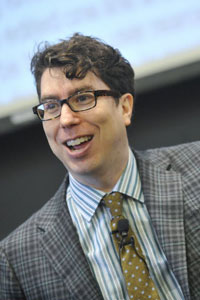News
The ongoing publication of more than 250,000 U.S. Embassy cables through the website known as Wikileaks has, predictably, sparked anger and debate in the realm of international relations. The political, legal, and ethical implications of such a deluge of unauthorized releases has dominated the front pages of the newspapers for weeks.
But those running the site, and its apparent leader, Julian Assange, seem to have become heroes to some fierce, if loosely organized, advocates of Internet freedom. Websites including Mastercard, Amazon, and Paypal have come under attack for withdrawing their services from Wikileaks. For the mysterious cyberattackers—who identify themselves only as "Anonymous"—Wikileaks has become a rallying cause.
Jonathan Zittrain, Professor of Computer Science at the Harvard School of Engineering and Applied Sciences and Professor of Law at Harvard Law School, and Molly Sauter, a research assistant at Harvard's Berkman Center for Internet & Society, this week published a list of responses to some of the biggest (and continually emerging) questions about the leaks and the subsequent cyberattacks.
While most newspapers are covering the political fallout of the publicized memos, Zittrain and Sauter weigh in on topics that delve further into the technical and legal aspects of Wikileaks, including: "What happens if Wikileaks gets shut down? Can it be shut down?" "What is the 'insurance' file?""Why did Wikileaks.org stop working as a way to find the site?" and "What are the risks of running a mirror site?"
An initial list of FAQs appeared in Technology Review on December 9, and Zittrain and Sauter have since added new responses to comments posted on Zittrain's blog.
Zittrain, who is also a co-founder of the Berkman Center, is considered an expert on Internet law and has written extensively on digital privacy, intellectual property, net neutrality, and free speech.
He holds a J.D. from Harvard Law School, an M.P.A. from Harvard's Kennedy School of Government, and a B.S. from Yale University. He is also the author of The Future of the Internet—And How to Stop It.
To read the article in Technology Review, click here. To read the extended FAQ on Zittrain's blog, click here.
Topics: Ethics, Computer Science
Cutting-edge science delivered direct to your inbox.
Join the Harvard SEAS mailing list.
Scientist Profiles
Jonathan Zittrain
George Bemis Professor of Law




